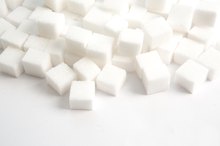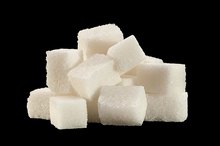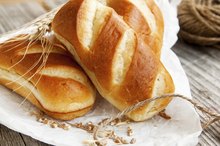What Do Carbohydrates, Lipids & Proteins Have in Common?
Carbohydrates, lipids -- more commonly called fats -- and proteins are all types of macronutrients. This means they're chemical compounds that you need in relatively large quantities, and that your cells use as a source of chemical energy. Structurally, carbohydrates are more similar to proteins than either are to fats, but all three share some common traits.
Carbohydrates
Carbohydrates are chemical compounds made up of one or more monsaccharides, where a monosaccharide means "single sugar unit." Monosaccharides act as the building blocks of carbohydrates, explain Drs. Reginald Garrett and Charles Grisham in their book "Biochemistry," and when you consume carbohydrates made of more than one monosaccharide, you split the monosaccharides apart through digestion and absorb them separately into the bloodstream. Your cells then burn them for chemical energy, store them or convert them into fat.
- Carbohydrates are chemical compounds made up of one or more monsaccharides, where a monosaccharide means "single sugar unit."
- Reginald Garrett and Charles Grisham in their book "Biochemistry," and when you consume carbohydrates made of more than one monosaccharide, you split the monosaccharides apart through digestion and absorb them separately into the bloodstream.
Proteins
Macromolecules in the Human Digestive System
Learn More
Proteins share similarities with carbohydrates. Like carbohydrates, they're made up of chemical building blocks, called amino acids. Also like carbohydrates, you must digest proteins into their building block constituents before you can absorb them into the bloodstream. You can use amino acids for energy, convert some of them into the monosaccharide glucose or store them as fat--another similarity between proteins and carbohydrates. Additionally, most proteins are water-soluble, as are carbohydrates.
- Proteins share similarities with carbohydrates.
- You can use amino acids for energy, convert some of them into the monosaccharide glucose or store them as fat--another similarity between proteins and carbohydrates.
Lipids
Lipids, or fats, aren't as chemically similar to proteins and carbohydrates, note Drs. Mary Campbell and Shawn Farrell in their book "Biochemistry." For starters, they're not made up of repeating "building block" units; instead, they consist of three molecules called fatty acids, connected to a common glycerol backbone, where glycerol is closely related to alcohol. You can't make either protein or carbohydrate from fat. When your cells absorb fat, they either burn it immediately or store it.
- Lipids, or fats, aren't as chemically similar to proteins and carbohydrates, note Drs.
Breakdown Products
Sucrose, Dextrose & Maltodextrin
Learn More
One of the biggest similarities among carbohydrates, proteins and fat is that all three break down into identical compounds. When you burn nutrient molecules for energy -- regardless of whether you're burning monosaccharides from carbohydrate, amino acids from protein, or fat -- you produce small molecules called acetyl-CoA. You then continue to burn the acetyl-CoA, eventually producing the waste products carbon dioxide and water. While the reaction pathways are different, the products of macronutrient combustion for energy are the same.
- One of the biggest similarities among carbohydrates, proteins and fat is that all three break down into identical compounds.
Related Articles
References
- “Biochemistry”; Reginald Garrett, Ph.D. and Charles Grisham, Ph.D.; 2007
- “Biochemistry”; Mary Campbell, Ph.D. and Shawn Farrell, Ph.D.; 2005
Writer Bio
Kirstin Hendrickson is a writer, teacher, coach, athlete and author of the textbook "Chemistry In The World." She's been teaching and writing about health, wellness and nutrition for more than 10 years. She has a Bachelor of Science in zoology, a Bachelor of Science in psychology, a Master of Science in chemistry and a doctoral degree in bioorganic chemistry.









